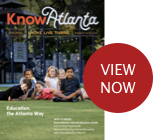Even for the littlest learners, choosing a school that teaches in a way your student understands and embraces is a critical building block in creating a passionate, engaged student. Below, school leaders at Primrose Schools, Springmont, Arbor Montessori and High Meadows explain their schools’ unique instruction styles and share the most important questions to ask when determining whether a new school is the right fit.
Making Sense of Different Teaching Methods
If you are seeking a specialized teaching method, such as Montessori, make sure you consider this when narrowing down your search. Springmont, located just inside of the I-285 perimeter in Sandy Springs, follows the Montessori method of instruction.
Established by Maria Montessori over 110 years ago, the curriculum is child-centered with a foundation of self-directed activity, hands-on learning and collaboration. “The Montessori approach views the child as one who is eager to learn and capable of thoughtful, independent work in a supportive environment,” said Stephanie McCaa, Arbor Montessori’s communications director. Serving students age 18 months to 14 years old, the school’s multi-age classrooms allow students to work with others who are older and younger than themselves. The older students serve as role models and tutors for the younger students, and in the process they gain confidence in their own abilities and self-esteem regarding their skill level and expertise.
At Springmont, which serves students from 18 months to 14 years old, a distinctive Montessori approach balances individualized learning with challenge and expectation, equipping students with the communication, collaboration and leadership skills needed to be effective in the future. “Students are encouraged to be inquisitive and compassionate and to develop both a global perspective and a sense of self,” said communications manager Julie Strickland.
But Atlanta area pre-K and early learning schools offer a variety of instruction styles. At Primrose, which has several locations throughout Atlanta, the school has an exclusive Balanced Learning curriculum that includes both purposeful play and nurturing guidance from teachers.
In Roswell, High Meadows School’s educational model is built around dynamic student engagement, incorporating inquiry-driven learning and hands-on application. Students in pre-K through 8th grade are actively involved in shaping their learning experiences in classrooms and across an expansive outdoor campus where problem-solving, deep thinking and citizenship are key to the curriculum.
 High Meadows School
High Meadows School
Still not sure which style suits your learner’s needs? Most of the pros said websites and mission statements are the best place to start, and many noted that many schools have a student profile, which is a clearly articulated description of the type of child that is the best fit with their programs, they would be glad to share. “ can ask school representatives or current parents at schools to describe an average day at school for them,” said Laura Nicholson, High Meadows’ director of admission and enrollment. “Including questions about opportunities for movement, academic challenge, outdoor time, lunch, and even after school programs can help a family establish a sense of what kind of fit the school might be for their child and family.”
Asking the Right Questions
Broken down by area, these are the questions the pros say should be at the top of your list:
- What’s your early learning approach or educational philosophy? Make sure this matches your own personal goals and values. You may be seeking an unstructured, play-based environment for your child; a more structured approach with guidance from teachers; or a balance of both. Ask how the approach translates into the daily activities and classroom experiences.
- What is distinctive about the learning environment? Observe the children at the preschool or provider — how they are playing and learning, how the teachers interact with them, and the atmosphere of the classroom. Some children thrive in a quiet classroom with less visual and auditory stimulation, while others perform best in a classroom full of discussion, movement, and art. Do the teachers create a loving, secure environment for the children to learn, and do they seem to genuinely care for the children? Ask to see the daily schedule and what types of experiences that includes.
- How will this program help my child continue to grow? Ask how the school helps extend what the children learn in the classroom at home. If there are different classrooms for various age levels, ask to see the rooms your child will grow into so you can get a full picture of the experience. While you are naturally focused on how the school will support your child at their current age, you’ll want to know what that will look like 5 or 10 years later.
- What level of parent communication and involvement is expected/encouraged? Being away from your child is difficult. Ask about the tools and processes the provider uses to keep parents informed each day. Do they send you a daily overview of the activities your child participates in? Do you know what your child ate for meals and snacks? Do they send you pictures throughout the day? Good parent communication will help give you peace of mind even on the toughest days. Also, if it’s important to you, find out what ways you can get involved in the school community and make sure the parent culture fits with your wants and needs.
- What is the safety protocol? Ask about the safety precautions the school or provider has in place (locks, placement of dangerous materials, etc.), as well as whether it has an emergency plan for various situations. You’ll also want to know how they will communicate with you in the event of an emergency.
- How is this school accountable for student outcomes? Many child care providers are accredited, but not all are held accountable for meeting certain standards on a regular basis. If quality is a big must-have for you, ask how the school or provider measures continuous improvement and whether a third-party holds it accountable for student outcomes. For example, when looking for a Montessori school, parents should look for the Association Montessori Internationale (AMI) accreditation. Any school can call itself a Montessori, but only an AMI-accredited school delivers the Montessori education based on the philosophy of Maria Montessori.



 High Meadows School
High Meadows School





